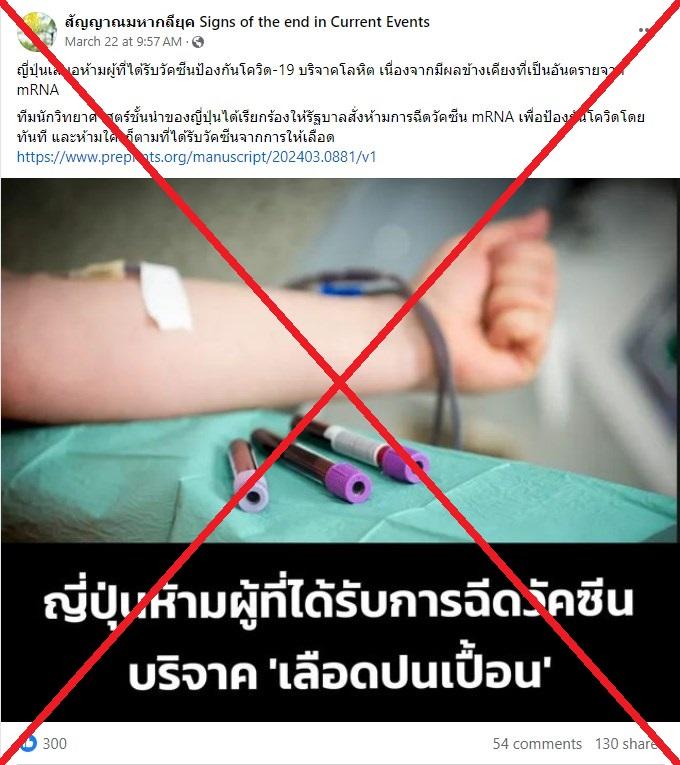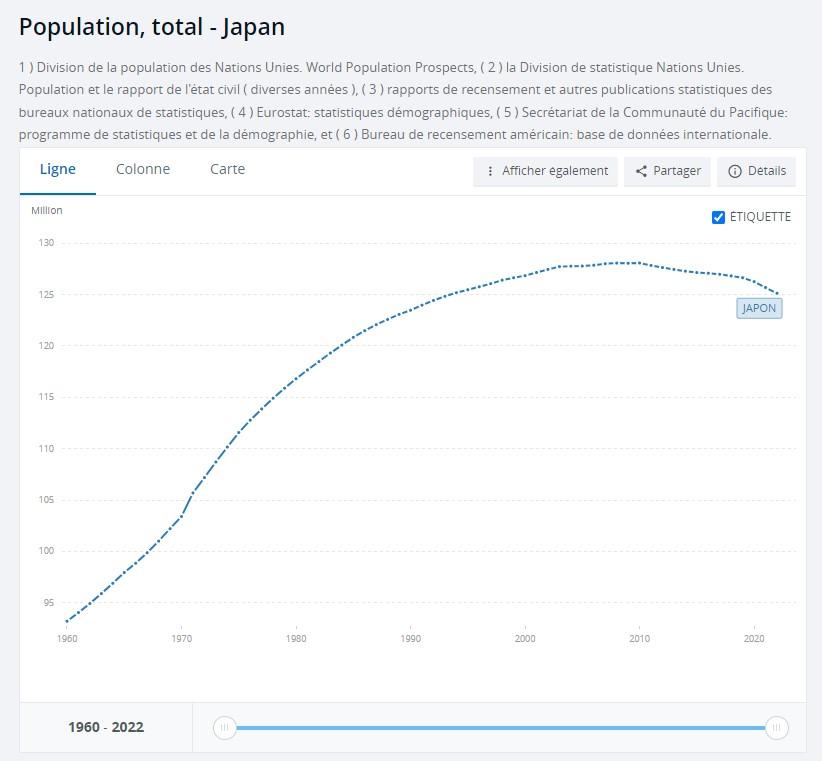
Japan has not moved to 'ban vaccinated people from blood donation' over 'contamination fears'
- This article is more than one year old.
- Published on April 4, 2024 at 09:36
- Updated on May 28, 2024 at 07:11
- 3 min read
- By Julie PACOREL, AFP France
- Translation and adaptation Chayanit ITTHIPONGMAETEE
"Japan proposes prohibiting people who have been vaccinated for Covid-19 from donating blood due to dangerous side effects linked to mRNA vaccines," read a Thai-language post published on Facebook on March 22, 2024.
The caption continued: "Japan’s leading team of scientists has called for the government to immediately ban mRNA vaccines used for Covid-19 prevention and to prohibit blood donations from people who have been vaccinated."
Additional Thai-language text superimposed on the photo of a person's arm read: "Japan bans the vaccinated people from donating 'contaminated blood'."
The post received 300 likes and 130 shares.

A similar claim that Japan had already banned Covid-19 vaccine recipients from donating blood was shared elsewhere in Thailand, South Korea, and the UK. AFP previously debunked the claim after it circulated in French.
These claims are false. As of April 2024, Japan has not banned Covid vaccines and vaccinated pepople can still donate their blood.
No ban on vaccinations, blood donations
Japan ended its free Covid-19 vaccination programme on March 31, 2024.
However, Japanese citizens under the age of 65 can be inoculated at their own expense, while the government will continue to provide Covid-19 vaccine shots to high-risk groups (archived link).
As of April 3, 2024, the website of Japan's Ministry of Health, Labour and Welfare states (archived link): "Regular vaccinations by local governments will begin in the fall/winter of 2024 for people aged 65 and over, and for those aged 60 to 64 with heart, kidney, or respiratory problems."
The Japanese Red Cross clarified on its website that vaccinated individuals were still eligible to be blood donors (archived link).
The Red Cross advises donors to wait 48 hours following an mRNA vaccine before donating blood.
AFP previously debunked the claim that Japan had banned mRNA vaccine recipients from donating their blood in 2021 here.
While a new Japanese study highlighted potential health risks of the "transfusion of genetic material through vaccines", the study has not been peer-reviewed (archived link).
The study is currently in "pre-print" after it was released in March 2024 on a website that allows publications without any preliminary review.
The study was published one day after it was submitted to the website, a period too brief to permit a thorough review process.

One of the study's authors is Masanori Fukushima, an ex-professor dubbed an "anti-vaccine demagogue" by Japan's former vaccine chief Taro Kono.
Misleading claims of vaccinated individuals' blood "contaminating" unvaccinated individuals have been shared on social media since the Covid-19 vaccine rollout began in 2020.
The American Red Cross explained to AFP in 2022 that the vaccine's components do not circulate in the bloodstream of vaccinated people.
No increase in 'sudden deaths'
Japan's population decline is unrelated to Covid-19 vaccinations, as some of the misleading posts written in French claimed.
The East Asian country's demographic had been shrinking for more than a decade, marked by a negative growth rate -- where deaths outweigh new births (archived link).
AFP previously debunked false claims that two-thirds of Pfizer vaccine recipients in Japan had died ten days after their jab.
Below is a screenshot from the World Bank's website, which shows Japan's population dating back to the 2010s, as depicted in the following graph:

The World Health Organization (WHO) has repeatedly stated that Covid-19 vaccines remain safe, and that serious side effects are "extremely rare" (archived link).
AFP has debunked claims that have falsely linked the vaccines to a spike in fatalities here and here.
The date of Japan's Ministry of Health, Labour and Welfare's statement on its annual vaccine inoculation was corrected to 2024, from 2020April 30, 2024 The date of Japan's Ministry of Health, Labour and Welfare's statement on its annual vaccine inoculation was corrected to 2024, from 2020
Copyright © AFP 2017-2026. Any commercial use of this content requires a subscription. Click here to find out more.
Is there content that you would like AFP to fact-check? Get in touch.
Contact us
